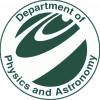User Tools
Sidebar
bad_bursters
This is an old revision of the document!
Bad Bursters Logbook
Goal
We have decided to analyze the accretion onto a neutron star just up until the hydrogen burning begins. We'll first attempt this as an adaptation to the Bondi accretion problem with a solid sphere near the origin (also relevant to the problem of infall onto the proto-neutron star during core collapse). If we're successful, we'll try an accretion disk in 2D with polar geometry.
Log Book
- Input Person (Sarah Schwartz)
- [X] X-ray bursts
- [X] Accretion rate ~ 10^-8 Solar Mass / yr
- [X] Radius ~ 10-15 km
- [X] Mass ~ 1 Solar Mass
- [X] Novae
- [X] Accretion rate ~ 10^-9 Solar Mass / yr
- [X] Radius ~ 10^4 km
- [X] Mass ~ 1 Solar Mass
- [ ] Density of in falling material
- [X] Alpha parameter = 0<alpha<1
- Code Person (Justin Brown)
- 2D
- [X] Get the VH-1 polar model working.
- Set ngeomx = 1 (radial cylindrical), ngeomy = 3 (theta), nlefty = 3, nrighty = 3 (periodic)
- [X] Set up accretion
- Set nrightx = 2 (constant inflow), uotflo * rotflo * outer area of simulation (2 * pi * xmas) = 1
- Set votflo to be the desired velocity at the boundary edge
- [X] Implement gravity
- In forces, set grav (n) under sweep “x”, cylindrical to be -GM/xao(n)**2
- [X] Implement a viscosity model.
- We're choosing to use the derivative in the radial direction of only the tangential coordinate
- alpha*1/r(dv/dr)+alpha*d2v/dr2
- In forces, set grav (n) under sweep “y”, cylindrical angle to the above expression
- [X] Run Models
- [X] Non-dimensionalize
- The length unit is the radius of the neutron star, R_ns
- The time unit is sqrt (R_ns^3/GM_ns)
- The mass unit is M'sqrt (R_ns^3/GM_ns), where M' is the mass infall rate
- [X] Determine free parameters
- Outer radius of simulation, xmax
- Infall velocity, uotflo
- Viscosity, alpha
- Tangential initial velocity, votflo
- [X] Run models with uotflo = -0.1, votflo = 0.2, xmax = 10.0
- [X] Viscid (alpha = 1.0)
- [X] Semi-Viscid (alpha = 0.1)
- [X] Inviscid (alpha = 0.0)
- [] Run models with uotflo = -1.0, votflo = 0.2, xmax = 10.0
- Analysis Person (Amber Lauer)
- [x] Get visualization working
- [x] Install NetCDF
- visit on ubuntu/linux was a quagmire, went with windows virtualbox installation :(
- [x] Gathering the initial conditions for novae and X-ray bursts
- have average values for NS and WD, time permitting will constrain to single case and derive from scratch
*[x] PRESENTATION
- [x] Outline concepts and highlight theory for presentation
- [x] Encode .cdf data to video for presentation
- [x] Compile references for presentation
- [x] Compile images for presentation
XX * [ ] Determine the input abundances
- [ ] Build the nuclear network for the problem
- [ ] Take output from the codes
- [ ]determine when hydrogen burning begins
- [ ]analyze data values to optimize scale(linear vs log) and ranges(0-?) for visualization
XX
Above determined to be outside scope of project.
Link to Code on GitHub: External Link
Parameter sources
- Accretion Power in Astrophysics - Frank, King, Raine
- Accretion Disk for Beginners : External Link (Notes PDF)
bad_bursters.1402087024.txt.gz · Last modified: 2014/06/06 16:37 by lauer
Except where otherwise noted, content on this wiki is licensed under the following license: CC Attribution-Share Alike 4.0 International





Comments
Hi, after reading this amazing paragraph i am as well happy to share my knowledge here with mates. science http://thissiteissick.com